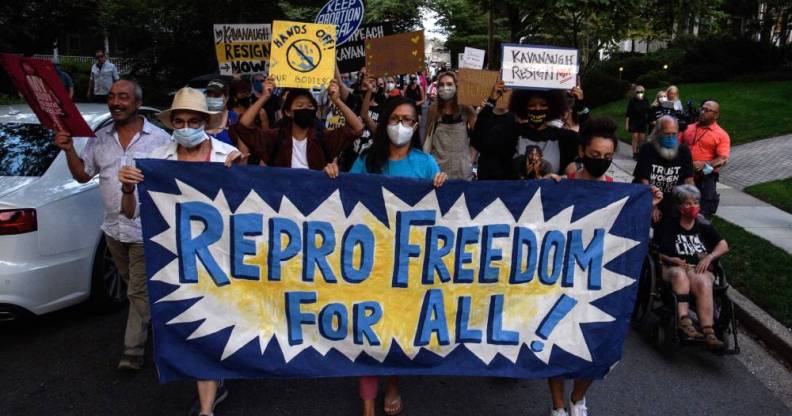‘Architect’ of reviled Texas abortion ban calls crucial LGBT+ rights ‘lawless judicial concoctions’

Activists march to US supreme court justice Brett Kavanaugh’s house on 13 September 2021, following the court’s decision to uphold Texas’ stringent abortion law. (Nicholas Kamm/AFP via Getty)
Jonathan F Mitchell, a key lawyer behind the new controversial Texas abortion law, has attempted to undermine crucial LGBT+ rights in the US in a court document.
The former Texas solicitor general has been described by the Guardian as the “legal architect” of the state’s abortion ban, which makes it illegal for a person to get an abortion beyond six weeks of pregnancy.
The case has sparked international outrage, but is not isolated. In December, the Supreme Court will hear oral arguments on Dobbs v Jackson Women’s Health Organization, that centres on the legality of a Mississippi law that can ban abortion after 15 weeks of pregnancy.
The case threatens to overturn Roe v Wade – the landmark decision that guarantees a right to abortion in the US.
Mitchell submitted an amicus briefing concerning the Mississippi case dated 29 July with co-author Adam K Mortara. In it, they called Roe v Wade “lawless”, a label they also assigned to Lawrence v Texas, which legalised gay sex in the US, and Obergefell v Hodges, which made marriage equality the law of the land.
“These ‘rights’, like the right to abortion from Roe, are judicial concoctions, and there is no other source of law that can be invoked to salvage their existence,” the brief said.
They clarified that overruling Roe wouldn’t automatically “announce the overruling” of Lawrence and Obergefell but suggested “neither should the court hesitate to write an opinion that leaves those decisions hanging by a thread”.
Melissa Murray, who is the Frederick I and Grace Stokes professor of law at New York University, tweeted about the amicus brief and the risk it could pose to LGBT+ rights.
“So the focus here is on Roe & Casey … for now,” Murray warned. “The long-term plan is to overturn all of these decisions.”
Lawrence v. Texas is the 2003 decision that decriminalized same-sex sex. Obergefell v. Hodges is the 2015 decision that legalized marriage equality across the country.
So the focus here is on Roe & Casey … for now. The long-term plan is to overturn all of these decisions.
— Melissa Murray (@ProfMMurray) September 18, 2021
Religious liberty is ‘undermining reproductive and LGBT+ rights’
Katherine Franke, the James L Dohr professor of law and director of the Center for Gender and Sexuality Law at Columbia University, told PinkNews that the Supreme Court overturning the Roe decision would not “necessarily implicate LGBTQ rights”.
She explained that the “likes of Mitchell” regarded the groundbreaking LGBT+ rulings with “equal contempt to that in which they hold Roe”, but the Supreme Court rested their decisions on Lawrence and Obergefell on a “complex combination of liberty and dignity rights”.
“Thus, if Roe falls, those cases still stand,” Franke told PinkNews. “Perhaps, more importantly, the court reaffirmed the equality rights of LGBTQ people a year and a half ago in Bostock v Clayton.”
But she warned that there is a “new tiering of rights” where the supreme court appears to be recognising some rights, “such as religious liberty”, as a “top tier right” above others.
“Over the last two years, the court has increasingly recognised a religious liberty right to be exempt from laws to which a person has a faith-based objection,” Franke explained. “In effect, the expansion of constitutional protections for religious liberty has had the effect of undermining rights otherwise secured by the constitution or federal laws – such as reproductive rights or rights to LGBTQ equality.”
She continued: “In essence what we are seeing is a new tiering of rights, in which the court recognises some rights – such as religious liberty – as a top tier right, and other rights – such as reproductive liberty or LGBTQ equality – as second tier, and thus these rights must yield when they come into conflict with first-tier rights.
“This is a novel and radical new interpretation of the rights secured by the US constitution, one that reflects the new extremely conservative make up of our Supreme Court.”

